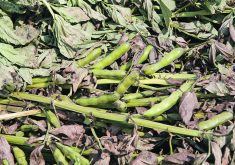Protein Industries Canada recently received another $150 million from the federal Global Innovation Cluster program
Protein Industries Canada says a second wave of plant-based protein fractionation plants is on the way.
“We’ve got five or six members that are in the midst of active raises of capital that are looking to commission, break ground and get plants operational in the next five years,” said chief executive officer Bill Greuel.
The average size of a fractionation plant tends to be around 100,000 tonnes of annual processing capacity, so there could be another 500,000 tonnes of domestic demand within five years.
“That would be a pretty good win for Canada,” he said.
Read Also

Bunge’s crop mix is changing
Bunge has predominantly been a soybean processing firm, but that’s about to change after the merger with Viterra with softseed processing and grain merchandising gaining ground.
The organization recently received a new tranche of $150 million in funding from the federal government’s $750 million Global Innovation Cluster program announced as part of Budget 2022.
It had requested $200 million in funding but is pleased with the amount it received.
That brings total federal government funding for the group to $353 million from 2018 through to 2028, when the most recent five-year funding program draws to a close.
“It’s good to see the government of Canada put the agriculture sector on the same playing field as other areas of the economy as a growth opportunity for the country,” said Greuel.
During the first tranche of funding the organization invested $173 million into 55 projects. That investment leveraged another $538 million in private sector funding.
Those projects are expected to contribute $15 billion in gross domestic product and create 10,800 direct and indirect jobs by 2031.
However, Greuel acknowledged that all that money has not resulted in a much bigger market for the crops farmers produce.
Yellow peas are by far the most popular crop for protein fractionation purposes.
However, domestic use of peas in 2023-24 is forecast at 680,000 tonnes, which is below the 901,000 tonnes used in 2018-19 when the first tranche of funding was announced.
Greuel noted that the Ingredion and Roquette plants were in the early stages of construction when the initial tranche was announced.
Those plants are now up and running, and he believes the second wave will materialize over the next five years, so domestic consumption numbers for peas and other protein crops should soon be on the rise.
That is one of the reasons why Protein Industries Canada will be investing more heavily in projects that are further down the value chain in this second round of funding.
While the first fund supported proof of concept work, the second will focus on scaling up existing technologies, resulting in commercial products hitting the marketplace.
There are four focus areas for funding —genetics, crops, ingredients and products.
Three-quarters of the money will be spent on the ingredients and products areas this time, compared to 60 percent last time.
Greuel also anticipates that 80 percent of the $150 million will be allocated within the first 24 months of the five-year program because projects take time to come to fruition.
Protein Industries Canada started accepting applications for new projects March 1. Expressions of interest will be accepted until April 19, 2023.
Greuel said there is no cap on how much money will be doled out during that first call, but it will likely be about 30 to 40 percent of the funding, depending on the quality of the submissions.
Protein Industries Canada is doubling down on its value-chain approach to funding. Projects must have a consortium of at least three partners, up from two in the first round. One of those partners must be a small- to medium-sized enterprise.
Projects must include the use of high-protein crops such as lentils, peas, chickpeas, canola, fababeans, oats, flax, lupin or soybeans.
Approved projects may receive up to 45 percent reimbursement of eligible costs.
Some projects from the first round of investments include Wamame Foods’ plant-based Wagyu beef, New School Foods’ whole cut of plant-based salmon, Konscious Foods’ plant-based sushi and Big Mountain Foods’ new fava tofu.
















